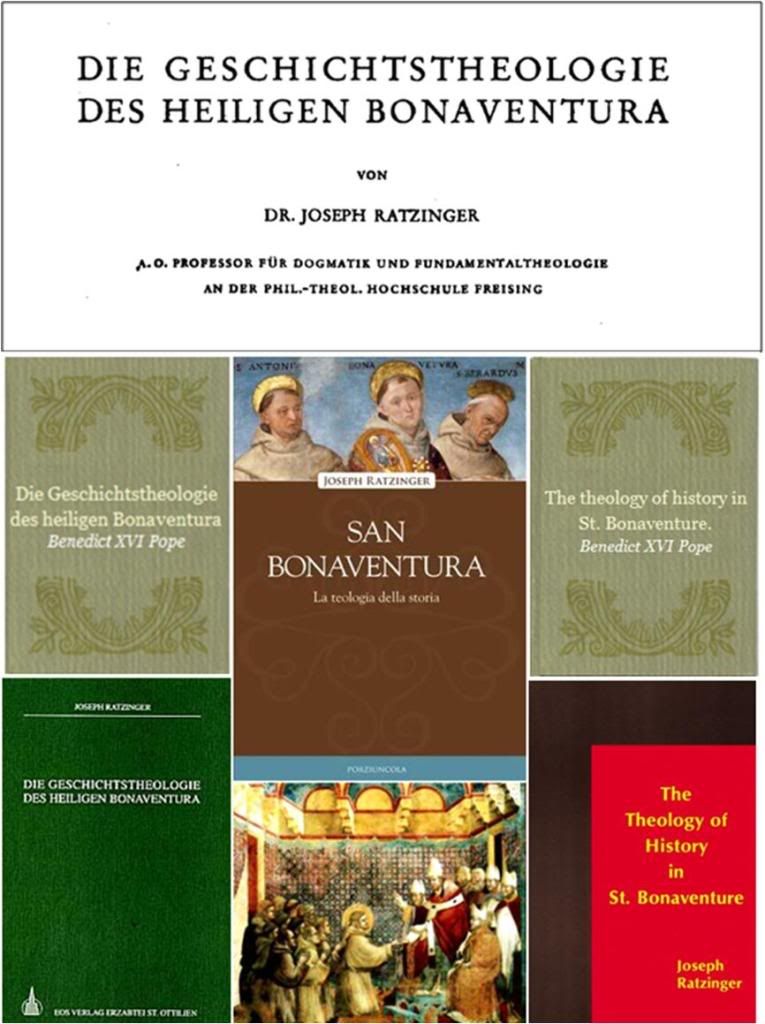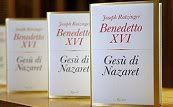
 There's a second article in tomorrow's OR about the new book.
In the studies of the young Ratzinger:
There's a second article in tomorrow's OR about the new book.
In the studies of the young Ratzinger:
Revelation as in a medieval 'disputatio'
by Paolo Vian
Translated from
the 9/16/09 issue of

The research studies of Joseph Ratzinger have always been profoundly linked to the theological reflection of his time, as he indicates in his autobiographical
Aus meinem Leben: Erinnerungen (1927-1977) [published as
Milestones in English), first published in 1998 but published one year earlier in an Italian translation.
And as Gianni Valente has reconstructed in a series of articles in
30 Giorni, and then in the book
Ratzinger professore (2008),
His 1950-1951 study on the concepts of "the people and the Church of God" in St. Augustine - suggested to the young Ratzinger by his professor in fundamental theology at the theological faculty of the University of Munich, Gottlieb Söhngen (1892-1971) - arose from the ecclesiological debate that dominated the first half of the 20th century, which sought new paths after the re-proposal by Pius XII of the concept of the 'Mystical Body' as a description of the theological nature of the Church in his encyclical
Mystica corporis (1943).
Similarly, the subject he chose for his thesis of Habilitation for university professorship in Germany was in the context of German theological reflection in the 1950s on the story of salvation.
Again, at the suggestion of Söhngen, the young Ratzinger undertook to investigate St. Bonaventure's ideas on Revelation in order to seek out eventual correspondences with the concept of the story of salvation which was the focus of contemporary theological studies.
He finished the work and submitted it in the autumn of 1955. The other adviser for the thesis was Michael Schmaus (1897-1993), acting ex officio as professor of systematic theology, who was also a distinguished medievalist.
Schmaus was prompt to issue a harsh criticism of the work, not without personal interest because of his ongoing professional rivalry with Söhngen. The faculty council thus returned the dissertation to Ratzinger, urging him to act on the observations of Schmaus.
However, a revision of the work based on Schmaus's objections would have meant a lot of time that Ratzinger did not have, and which would have hampered getting his Habilitation in time.
But the young priest saw a way out: the second part of the dissertation, dedicated to Bonaventure's theology of history, had 'survived' Schmaus's critique almost untouched. Although it was linked to the rest of the work, it could stand as an independent study.
Moreover, it was rich with great material because Ratzinger had shown the profound Bonaventurian link to the theology of history by Joachim of Fiore, whose infiltrations into the Franciscan movement Bonaventure fought with energy and decisiveness.
Thus, for his final oral exam for his Habilitation, Ratzinger presented only the second part of his study, having made the necessary changes in the summer of 1956.
In February 1957, the faculty council approved the dissertation, which he defended in public on Feb. 21, in a session that was marked by a confrontation between Schmaus and Söhngen that was almost like a heated medieval 'disputatio'.

On January 1, 1958, Ratzinger was named a professor of the University of Munich, and the following year, the publishing house Schnell and Steiner published the approved dissertation,
Die Geschichtstheologie des heiligen Bonaventura, which was translated into Italian and English in 1971, into French in 1988, and last year, a new edition in Italian.
Now, at a distance of half a century, the integral text of the dissertation written by Joseph Ratzinger in 1955-1956 is finally published.
Out of curiosity, I checked out what Hans Kueng's doctoral dissertation was (he earned his doctorate from the Sorbonne's Institut Catholic in 1954): Justification. La doctrine de Karl Barth et une réflexion catholique, was published in English in 1964, i.e., during the Second Vatican Council when he first started making a name for himself. Ratzinger's dissertation on Augustine was published in 1954, shortly after he got his degree. Kueng was appointed professor in Tuebingen in 1960 but I have not been able to find an entry yet for what his Habilitationschrift was.
I suppose what I am trying to say, among other things, is: how many young priests would choose to write their academic dissertations on two Doctors of the Church who were also the most prolific of writers? Researching two highly documented and 'over-commented' writers from the remote past is infinitely more difficult than choosing a contemporary subject like, say, a 20th-century theologian like Barth. Fr. Ratzinger would have read his primary sources in Latin, even.
And bless Prof. Soehngen for suggesting the dissertation subjects to his student! He must have known full well Joseph Ratzinger would meet the challenge excellently, and he must be among the many looking down from heaven today on the Pope they helped to shape.


 Speaking of books, yet another confirmation that JON-II is now expected to come out early next year:
Pope's new book expected
Speaking of books, yet another confirmation that JON-II is now expected to come out early next year:
Pope's new book expected
to be published in 'early' 2010

Vatican City, Sept. 16 (dpa) - The second part of Pope Benedict XVI's bestselling 2007 book,
Jesus of Nazareth, is likely to be published "early" in 2010, the Vatican's chief spokesman said Wednesday.
Father Federico Lombardi said Benedict is currently working on the last chapter of the book which is expected to cover Jesus's death on the cross and his subsequent resurrection.
Initial plans for the book to be completed during the summer received a setback when the 82-year-old, German-born Pontiff, fell and broke his right wrist in July during his holiday in the Italian Alps.
"The Holy Father has been working intensively on the book during August and September and if everything goes according to plan, it is possible that the book will be published early next year," Lombardi told the German Press Agency dpa.
Benedict, who is right-handed, was initially forced to dictate text into a audio recorder while his wrist remained in a cast until late August.
A precise publication date for the book will be announced only once the text has been edited and translated from the German into other languages, Lombardi said.
[Modificato da TERESA BENEDETTA 16/09/2009 13:28]